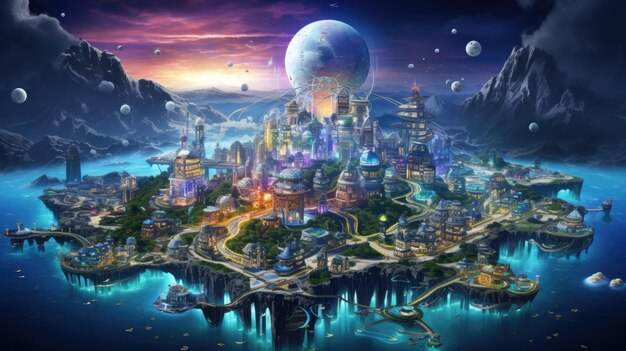The concept of a thriving community, particularly in a space colony, captivates the imagination. A vibrant colony poised among the stars invites contemplation on human potential, innovation, and the resilience of communities in the face of challenges. Such a community, set in the expanse of space, embodies the aspiration for a harmonious existence, fostering curiosity about how life might flourish beyond the confines of Earth.
At its core, the idea of a space colony symbolizes a transformative leap in human history. As we grapple with the pressing realities of climate change and environmental degradation on our home planet, exploring life in a vibrant community situated in the cosmos encourages a shift in perspective. It forces us to rethink sustainable living and our relationship with nature, urging us to consider alternative habitats that align with ecological principles.
Imagine the vibrant tapestry of a space colony designed with ecologically sustainable practices. Picture structures crafted from innovative materials, harmoniously integrated with renewable energy technologies such as solar panels, wind turbines, and bioenergy systems. The architecture is not merely functional; it is an expression of an ethos that prioritizes environmental stewardship. Living greenspaces, vertical gardens, and biophilic designs imbue this colony with life and vibrancy, promoting mental well-being and community engagement.
The colony serves as a microcosm, a living laboratory where scientists, architects, and sociologists work in concert to develop solutions adaptable to Earth’s unique challenges. Is there a more pressing issue than climate change? This community can pioneer methods for sustainable food production through advanced hydroponics and aquaponics systems, creating a closed-loop environment where waste is minimized, and resources are reused. The quest for food security becomes a collaborative endeavor, engaging individuals in agriculture, science, and economics.
Moreover, the cultural dynamics of such a colony offer a fascinating glimpse into human interactions beyond the cultural and national boundaries that often divide us on Earth. This vibrant melting pot would celebrate diverse backgrounds, fostering an environment where innovation flourishes through the merger of ideas. The colony’s art, music, and communal events would echo the collective human experience, reflecting a conscious choice to thrive together rather than clone society’s existing hierarchies.
What if we shifted our view of wealth? In a space colony, currency may transform into a system based on sustainable contributions. Individuals who invest time in community projects, from environmental restoration to educational initiatives, would glean recognition and resources, fostering a sense of mutual accountability and interdependence. This paradigm offers an intriguing contrast to the individualistic pursuits that often drive competition on Earth, providing an opportunity for collective growth.
As humans explore the cosmos, ethical considerations surrounding our actions are paramount. A vibrant colony in space would necessitate a profound commitment to ethical stewardship—protecting ecosystems and responsibly utilizing resources. Scientists and ethicists must collaborate to establish regulations that prevent exploitation while promoting harmony with the environment. Engagement in these conversations can redefine our understanding of progress, urging us to value planetary well-being over mere technological advancement.
Engaging with the concept of interstellar travel catalyzes a deeper understanding of our terrestrial responsibilities. As we gaze upward at the stars, reflecting on the potential of a space colony, we are compelled to revisit our stewardship on Earth. This fusion of aspirations can illuminate paths toward more conscientious choices, signaling a broader movement dedicated to preserving biodiversity, reducing carbon footprints, and embracing renewable energy sources.
Additionally, envisioning a vibrant space colony invites contemplation of human adaptation. Life in space challenges us to rethink societal norms, including governance, social structure, and conflict resolution. A well-functioning community must construct systems that encourage cooperation and adaptability as occupants confront the intricacies of their new environment. What mechanisms of cooperation would emerge in a space colony? Surprisingly, the challenges of space habitation might mirror those encountered on Earth, offering resilience through shared experiences.
Ultimately, the colony serves as a larger metaphor—urging us to visualize our present environment in new ways. By exploring the dynamics of a vibrant community thriving in space, we are called to reassess our relationship with the Earth. Sustaining life beyond our planet depends on illuminating pathways for eco-conscious innovation and empathetic governance, anchoring our vision of the future in collective responsibility.
Moreover, this exploration emphasizes the importance of education and dialogue. The narratives that emerge from vibrant colonies can inspire generations to commit to environmental actions that yield lasting impact. Each story, every lesson learned, ignites curiosity and engagement, furthering the momentum towards sustainability. As a result, the legacy of the colony becomes not only a testament to human ingenuity but also a clarion call for a unified approach to nurture both the cosmos and our planet simultaneously.
In conclusion, envisioning the vibrant community in a space colony brings forth the promise of profound shifts in our perspective. Such explorations challenge us to cultivate curiosity, interconnectedness, and sustainability as we endeavor to foster a more harmonious existence. With each glance at the stars, we can remind ourselves that the journey toward a sustainable future begins here, on Earth, with the choices we make today.
